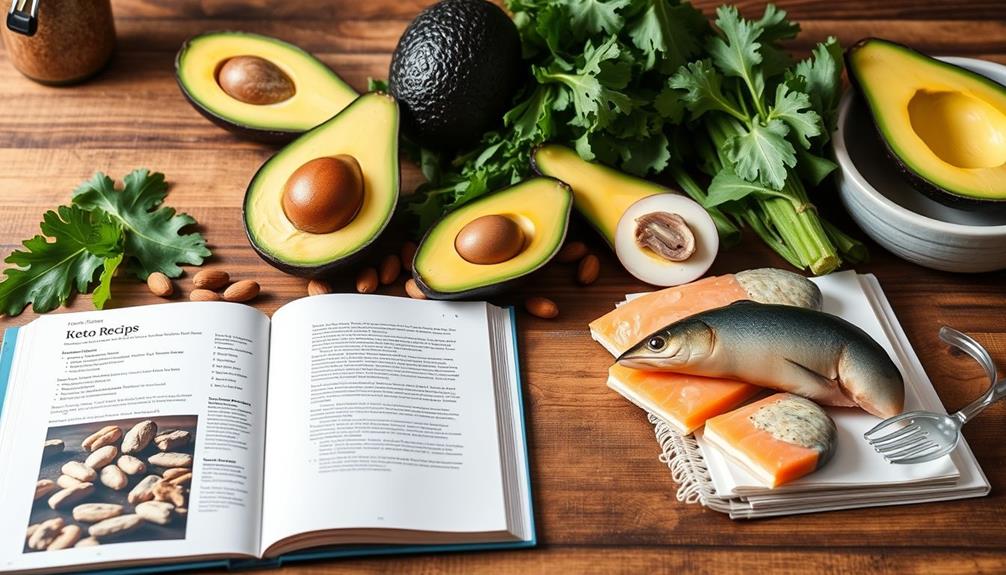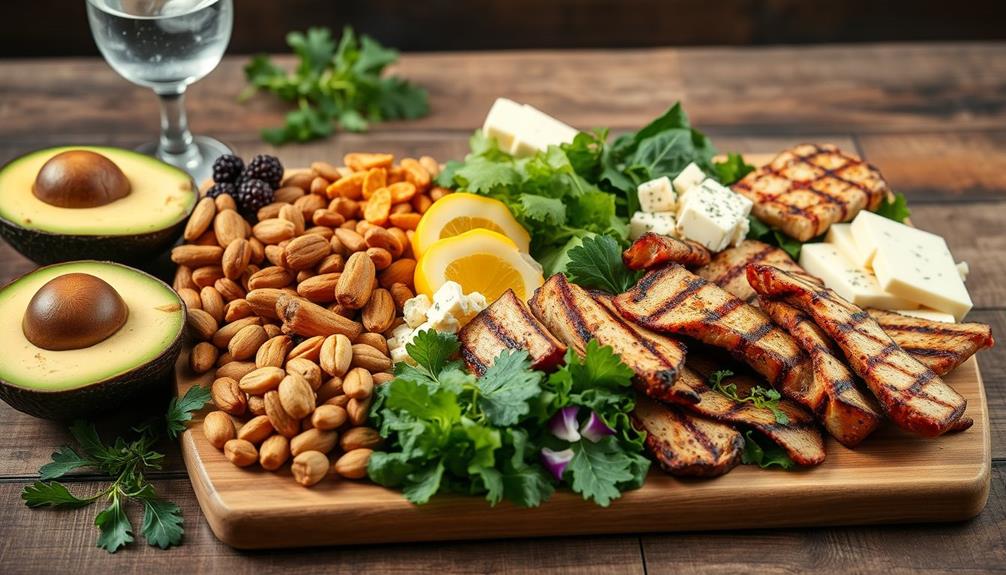To start a keto diet, aim for 70% fat, 20% protein, and only 10% carbohydrates in your meals. Limit carbs to 20-50 grams daily to enter ketosis. Focus on foods like fatty meats, eggs, and non-starchy vegetables, while avoiding sugary items, grains, and high-carb fruits. Meal prep helps you stay on track, so plan your meals ahead. Keep hydrated and monitor your macronutrient intake using an app or food diary to guarantee you hit your goals. With these strategies in mind, you're well on your way to embracing the keto lifestyle and achieving your health objectives. Starting a keto diet can be challenging at first, especially when it comes to avoiding high-carb foods that you may have been used to eating. However, with careful planning and dedication, the benefits of a keto diet, such as increased energy levels and weight loss, can be well worth the initial adjustment period. Remember to consult with a healthcare professional before starting keto diet, especially if you have any health concerns or conditions. With the right guidance and mindset, starting keto diet can be a positive step towards improving your overall well-being.
Key Takeaways
- Understand the macronutrient ratios: Aim for 70% fat, 20% protein, and 10% carbohydrates to induce ketosis effectively.
- Focus on high-fat foods like avocados, fatty meats, and healthy oils while incorporating low-carb vegetables for essential nutrients.
- Eliminate sugary foods, high-carb grains, and certain fruits; read labels to avoid hidden sugars in processed items.
- Prepare a weekly meal plan and batch cook keto-friendly dishes to make staying on track easier.
- Stay hydrated by drinking 6-8 glasses of water daily and consider electrolyte supplements to help with adaptation.
Understanding the Keto Diet

The ketogenic diet, often referred to as keto, is a high-fat, low-carbohydrate eating plan that usually consists of about 70% fat, 20% protein, and only 10% carbohydrates. This unique ratio aims to induce a metabolic state known as ketosis, where your body shifts from burning carbs for fuel to burning fat instead.
By keeping your carbohydrate intake to about 20-50 grams per day, you can encourage your liver to produce ketones, which serve as an alternative energy source for your brain. Including foods rich in antioxidants, like beetroot, can also support your overall health while on this diet, as they provide important nutrients to complement your keto meals nutritional benefits.
In addition to weight loss, the keto diet can help improve insulin sensitivity and reduce the risk of certain diseases. To get started, it's crucial to create a meal plan that focuses on healthy fats, such as avocados, nuts, and olive oil, while minimizing carbs from grains and sugars.
You might experience some side effects during the initial stage, often referred to as "keto flu." Symptoms like fatigue, headaches, and digestive issues are common, but they usually subside within a few weeks as your body adapts to this new fuel source.
Understanding these fundamentals will help set you up for success on your keto journey.
Essential Foods for Keto
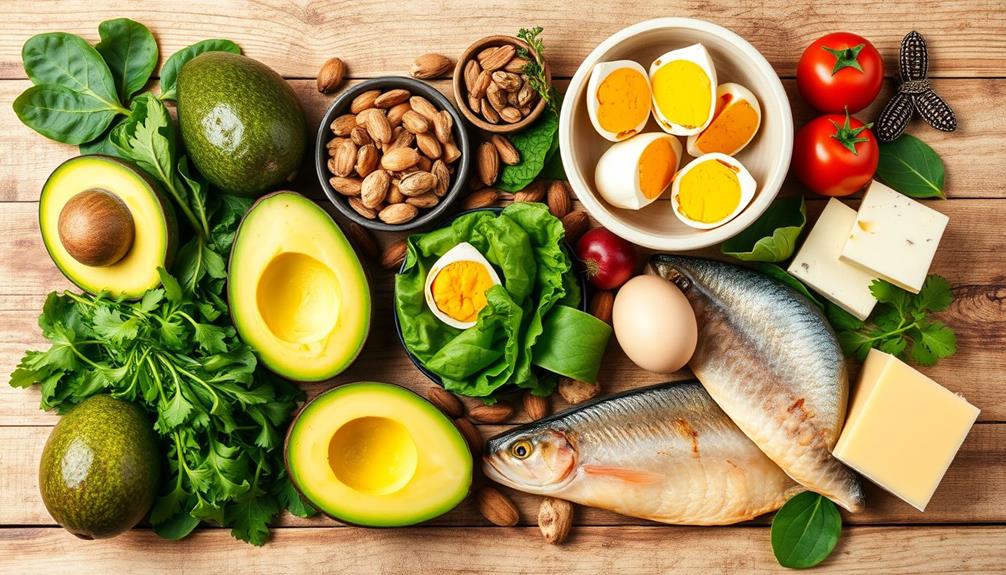
When starting your keto diet, it's essential to focus on important foods that support your goals. A balanced approach that includes a variety of nutrient-dense options won't only help you maintain ketosis but also guarantee overall health.
Key protein sources like fatty meats and poultry, along with healthy fats from avocados and olive oil, should make up the bulk of your meals. You can enhance your diet with low-carb vegetables, which provide critical nutrients without spiking your carb intake.
Incorporating mindfulness practices can also assist in managing emotional eating during your shift to this new lifestyle.
Key Protein Sources
Starting your keto journey involves focusing on key protein sources that fuel your body while keeping carbs low. In a ketogenic diet, you'll want to prioritize high-quality proteins that also offer healthy fats. Fatty cuts of meat, like ribeye steak and pork belly, are perfect options, as they provide essential fats while keeping your carb counts minimal.
Additionally, incorporating foods that support overall health and well-being is important, such as those that can help manage inflammation and provide essential nutrients cold medications overview.
Eggs are another fantastic choice, delivering about 6 grams of protein and less than 1 gram of carbohydrates each. They're versatile and can be used in countless recipes.
Fatty fish, such as salmon and mackerel, boast around 22 grams of protein per 3-ounce serving and are rich in omega-3 fatty acids, supporting heart health.
Don't overlook poultry, especially dark meat like chicken thighs, which provides approximately 28 grams of protein and zero carbs per 3-ounce serving.
Finally, full-fat dairy options like cheese and Greek yogurt are excellent for your low carb diet, with hard cheeses averaging 7 grams of protein and just 1 gram of carbohydrates per ounce.
Including these healthy foods in your meals will help optimize your protein intake and support your weight loss goals on the keto diet.
Healthy Fats Selection
Incorporating healthy fats into your keto diet is crucial for achieving and maintaining ketosis. Healthy fats should make up 70-80% of your daily caloric intake. Focus on sources like olive oil, avocado oil, nuts, and seeds, as these can also aid in financial health by allowing you to invest in your well-being.
For instance, 1 ounce of macadamia nuts delivers about 21 grams of fat with only 2 grams of net carbs, making them a fantastic keto-friendly snack.
Don't forget full-fat dairy products like cheese and heavy cream; they're great for adding both healthy fats and protein to your meals. However, be mindful of portion sizes to stay within your carb limits. Grass-fed butter is another excellent choice. It not only provides saturated fats that support ketosis but also offers anti-inflammatory benefits.
When cooking, opt for oils with high smoke points, such as avocado oil and ghee. This guarantees stability while retaining health benefits.
Low-Carb Vegetables
Low-carb vegetables are a cornerstone of the ketogenic diet, providing essential nutrients without pushing you over your daily carb limits. Incorporating non-starchy veggies into your meals can help maintain your carbohydrate intake while keeping your meals vibrant and nutritious.
Additionally, ensuring proper hamster care can enhance your understanding of how to balance dietary needs for different living beings. Here are some top low-carb vegetable choices to reflect on:
- Leafy greens (like spinach and kale)
- Broccoli and cauliflower
- Zucchini and bell peppers
- Asparagus and cucumbers
These options typically contain fewer than 5 grams of net carbs per serving, making them perfect for your high-fat diet. They're also rich in fiber, which supports digestive health and prevents nutrient deficiencies.
On the flip side, you'll want to steer clear of high-carb vegetables like potatoes, carrots, and corn, as they can quickly exceed your daily carb limits and disrupt your change into ketosis.
Additionally, you can utilize low-carb vegetable substitutes, such as spiralized zucchini or cauliflower rice, to recreate your favorite high-carb dishes while sticking to keto guidelines.
Foods to Avoid

When starting a keto diet, it's essential to avoid sugary foods and drinks, as they can sabotage your progress.
Individuals with emotional dysregulation may find it particularly challenging to stick to dietary changes, as managing cravings can become overwhelming.
You'll also need to eliminate grains and limit most fruits to keep your carb intake low.
Additionally, steering clear of starchy vegetables and processed snacks will help you stay on track with your goals.
emotion regulation techniques can be beneficial in maneuvering these challenges.
Sugary Food Restrictions
To kick off your keto journey successfully, it's essential to steer clear of sugary foods that can derail your progress. Consuming these can greatly increase your carbohydrate intake and hinder the onset of ketosis. Here are some key items to avoid:
1. Soda and Fruit Juices: These drinks are packed with added sugars that can spike your carb levels. Instead, consider hydrating with herbal teas or infused water for a revitalizing alternative.
You can also explore ways to incorporate essential oils for health into your routine for additional benefits.
2. Cakes and Candies: These sugary treats are a no-go and will sabotage your efforts toward a low-carb lifestyle.
3. High-Sugar Fruits: Steer clear of bananas, grapes, and oranges. Opt for low-sugar options like berries in moderation instead.
4. Processed Foods: Be wary of hidden sugars lurking in sauces, dressings, and snack bars.
Additionally, be cautious with dairy products. Flavored yogurts and low-fat options often contain added sugars.
Always prioritize reading nutrition labels to identify these hidden dangers, as added sugars can show up under various names like sucrose, fructose, or corn syrup.
Keeping these tips in mind will help you effectively manage your carb intake and stay on track with your keto diet.
Grain Elimination Strategies
Grain elimination is a crucial step in your keto journey, as these foods are often high in carbohydrates and can quickly sabotage your efforts. To effectively implement grain elimination strategies, you should avoid grains like wheat, rice, corn, oats, and barley, which can disrupt ketosis by raising blood sugar levels.
Products made from grains, such as bread, pasta, cereals, and baked goods, should also be eliminated due to their high carb content, often exceeding your daily limit of 20-50 grams. Understanding the impact of different brewing methods on caffeine levels can enhance your energy management while on a keto diet.
Be vigilant about hidden grains lurking in processed foods, including sauces, soups, and snacks. Many of these items contain flour or other grain-based ingredients that can greatly contribute to carb intake. Instead, focus on low-carb alternatives like cauliflower rice, zucchini noodles, and almond flour. These substitutes help you maintain your desired macronutrient ratios while still enjoying familiar textures.
Reading nutrition labels is essential for identifying grain content. Watch for terms like "whole grain," "enriched flour," or "cereal" to avoid inadvertently consuming high-carb foods.
With these strategies, you'll be well-equipped to navigate your keto diet successfully.
Fruit Limitations and Alternatives
Fruits are often perceived as healthy snacks, but on a ketogenic diet, many of them can hinder your progress. Most fruits are high in carbohydrates, which can quickly exceed your daily limit of 20-50 grams needed for effective ketosis.
It's crucial to be aware of the unique flavor profiles and aromas that different fruits can offer, but they often come with a high carb count. Here are some fruit limitations to take into account:
- High-Carb Fruits: Avoid apples, bananas, and grapes; these can contain 20-30 grams of carbs each.
- Dried Fruits: Stay away from raisins and dates, as they can pack up to 70 grams of carbs per serving.
- Citrus Fruits: Use lemons and limes sparingly for flavoring; their natural sugars can add up.
- Low-Carb Options: Enjoy berries like blackberries, raspberries, and strawberries in moderation for a sweet treat.
Instead of traditional fruits, turn to alternatives like avocado. It's low in carbs and packed with healthy fats, making it a satisfying option that keeps you in ketosis without the carb load.
Meal Planning Strategies
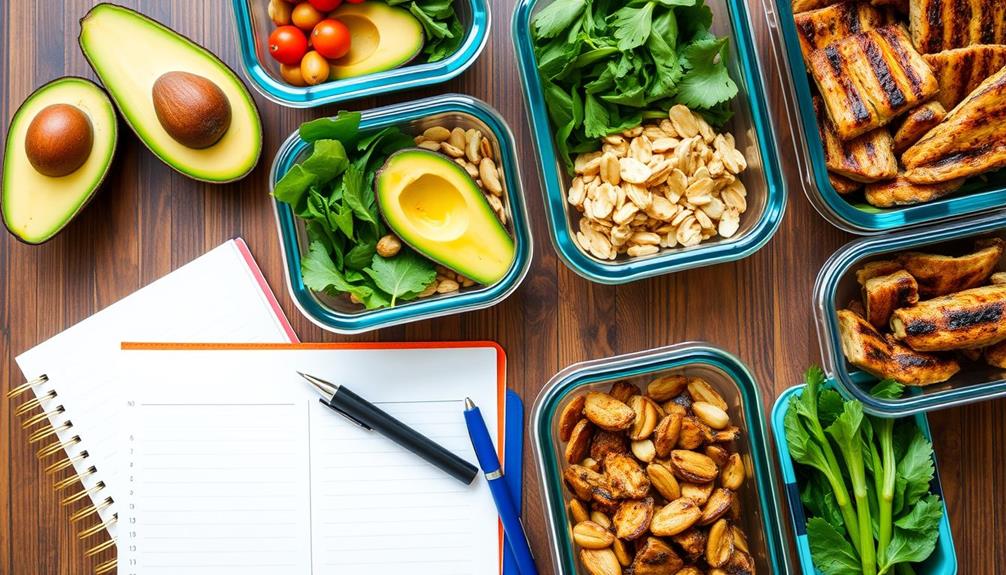
Effective meal planning is essential for successfully steering through the ketogenic diet. Start by focusing on high-fat foods like avocados, nuts, fatty fish, and non-starchy vegetables to maintain the necessary 70-80% fat intake.
For those new to the keto lifestyle, exploring best ways to earn money online can provide extra resources for meal planning. Prepare a weekly menu that includes breakfast, lunch, dinner, and snacks, guaranteeing you stay within the target of 20-50 grams of carbohydrates per day.
Batch cooking keto-friendly meals, such as casseroles or soups, is a smart way to save time and stay committed during busy weeks. Utilize meal prep strategies by pre-portioning snacks, making it easier to grab something quick without derailing your diet. You can also use low-carb substitutes for your favorite meals to keep cravings at bay.
To keep track of your progress, consider using a food tracking app. This will help you monitor your macronutrient intake and guarantee you stay within the ideal range for effective ketosis while keeping an eye on calories.
With these meal planning strategies, you'll find it easier to enjoy your keto journey and achieve your goals.
Managing Macronutrient Ratios
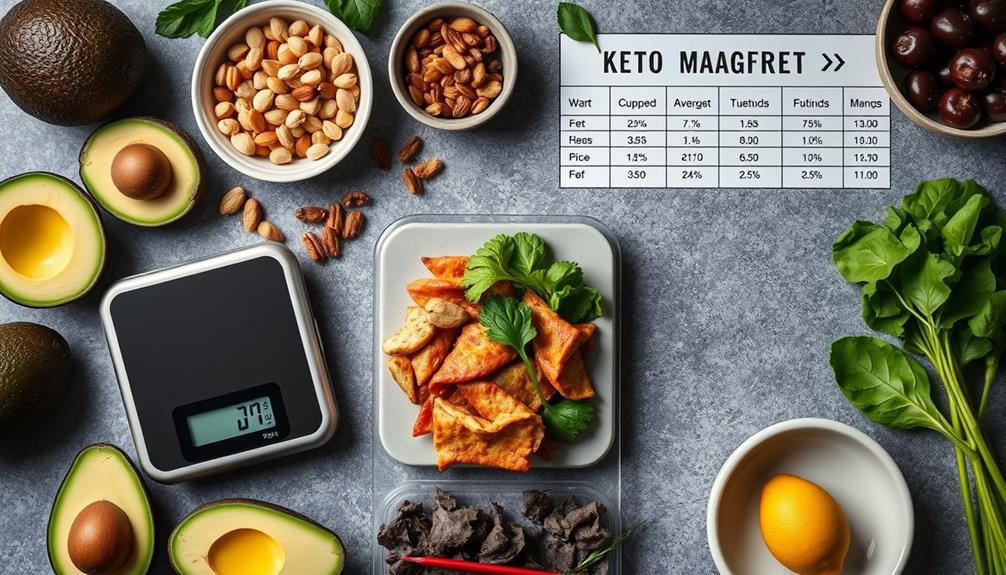
To succeed on a keto diet, you need to understand the macronutrient breakdown that supports ketosis.
It's crucial to track your daily intake to guarantee you're hitting those fat, protein, and carb targets.
As you progress, you might find it necessary to adjust these ratios based on your specific goals and how your body responds.
Understanding Macronutrient Breakdown
Understanding the right macronutrient breakdown is essential for successfully starting a keto diet. The goal is to achieve ketosis, which requires a specific ratio of fats, proteins, and carbohydrates. Here's a quick guide to help you:
- Fat Intake: Aim for about 70-80% of your daily calories from high-quality fats. Foods like avocados, olive oil, and fatty fish are great choices for fuel.
- Protein Intake: Keep your protein intake to about 15-20%. Too much protein can convert to glucose, hindering your ability to achieve ketosis.
- Carbohydrate Intake: Limit your carbs to around 5-10%, which translates to 20-50 grams per day. Focus on non-starchy vegetables to meet this requirement.
- Overall Balance: Monitor your macronutrient breakdown closely to guarantee you're adhering to the ketogenic diet guidelines.
Tracking Daily Intake
When starting on a keto diet, tracking your daily intake is essential for maintaining the right macronutrient ratios. Aim for about 70%-80% fat, 15%-20% protein, and less than 5%-10% carbohydrates, keeping total carb consumption under 20-50 grams per day.
To achieve this, utilize food tracking apps or journals to log daily meals. Accurately record the grams of fat, protein, and carbohydrates consumed to stay on target with your macronutrient ratios.
Reading nutrition labels is important, as hidden carbs and sugars in packaged foods can easily disrupt your goals if overlooked. Regularly reassess your macronutrient intake based on your weight loss progress and energy levels, making adjustments as needed to optimize ketosis.
Don't underestimate the significance of portion sizes. Consider using a kitchen scale to weigh your food accurately, as common serving sizes may not align with your personal keto diet goals.
Adjusting Ratios for Goals
Adjusting your macronutrient ratios is essential for tailoring the keto diet to meet your specific goals. Whether you're aiming for weight loss, increased energy levels, or muscle gain, the right ratios can make all the difference.
Here's how to structure your macronutrient intake based on different approaches:
- Standard Ketogenic Diet (SKD): Aim for 70% fat, 20% protein, and 10% carbohydrates (under 50 grams daily) to induce ketosis effectively.
- High-Protein Ketogenic Diet (HPKD): Shift to 60% fat, 35% protein, and 5% carbohydrates. This allows for higher protein while keeping carbs low.
- Targeted Ketogenic Diet (TKD): If you're active, add 20-30 grams of fast-acting carbohydrates around workouts to maintain energy levels.
- Cyclical Ketogenic Diet (CKD): Consider alternating between 5 days of strict keto and 2 days of higher carb intake to help manage muscle glycogen stores.
Regularly monitor and adjust your macronutrient ratios based on your progress and personal goals, ensuring fat remains your primary energy source while protein and carbs are tailored to fit your needs.
Common Side Effects

Starting a keto diet can come with a few common side effects, especially during the initial change to ketosis. One of the most talked-about issues is the "keto flu," which may introduce fatigue, headache, nausea, and irritability. This typically lasts 1-2 weeks and can be uncomfortable but is often a sign that your body is adjusting.
Here's a quick overview of some common side effects you might experience:
| Side Effect | Description |
|---|---|
| Keto Flu | Symptoms like fatigue, headache, and irritability |
| Fruity-Smelling Urine | A normal sign of ketosis as your body produces ketones |
| Digestive Issues | Changes in fiber intake may lead to diarrhea or constipation |
You may also face electrolyte imbalances due to increased water loss, leading to muscle cramps or dizziness. It's essential to maintain proper hydration levels and guarantee adequate sodium, potassium, and magnesium intake. While these side effects can be bothersome, they often resolve as your body adapts, making your change to ketosis smoother.
Importance of Hydration

Proper hydration is essential on a keto diet, especially since cutting carbs can lead to a decrease in glycogen stores, which means your body excretes more water and electrolytes. Staying hydrated not only supports your metabolic processes but also helps you avoid the dreaded keto flu.
Here are some key points to keep in mind:
- Drink enough water: Aim for at least 6-8 glasses of water daily. If you're active or in a hot environment, increase your water intake.
- Monitor electrolyte balance: Include electrolyte-rich foods or supplements like broth or added salt to maintain proper electrolyte levels. This is vital to prevent dehydration.
- Watch for symptoms: Dehydration can cause fatigue, dizziness, and cravings. Keep an eye on how you're feeling, especially during the shift to ketosis.
- Stay consistent: Regular hydration helps your body adapt more smoothly to the ketogenic lifestyle, reducing the risk of complications related to dehydration.
Monitoring Your Progress
As you embrace the keto diet and focus on hydration, it's equally important to monitor your progress to verify you're on the right track. Start by utilizing a food diary or mobile app to track your daily macronutrient intake. Aim to keep your carbohydrate consumption within 20-50 grams to maintain ketosis.
Weigh yourself regularly—ideally once a week—to observe weight loss progress, but remember that initial fluctuations might just be water weight loss.
To confirm that you're in ketosis, measure your ketone levels using urine test strips, blood meters, or breath analyzers, targeting levels between 0.5 to 3.0 mmol/L. Pay attention to your energy levels and mental clarity, as these indicators often reflect effective adaptation to the keto diet. A sustained increase in energy and focus usually suggests you're on the right path.
Additionally, schedule regular check-ups with your healthcare provider to monitor essential health markers like cholesterol levels and blood glucose. This way, you can verify the diet is positively impacting your overall health while you work towards your weight loss goals.
Keeping track of your progress is key to your success on this journey.
Long-Term Considerations

Long-term adherence to the ketogenic diet can be tough for many people, often leading them to revert to previous eating habits within a year and experience weight regain.
To support sustainable long-term weight loss, consider these key factors:
- Meal Planning: Careful meal planning is essential to avoid nutrient deficiencies. Focus on incorporating a variety of whole foods to guarantee you get all the essential vitamins and minerals.
- Regular Monitoring: Keep an eye on your cholesterol levels and overall health. Regular check-ups can help catch any potential negative impacts on cardiovascular health early on.
- Shift Diet: After a ketogenic phase, shifting to a more balanced diet can help maintain weight loss. Aim for a moderate carbohydrate intake while retaining lower carbs and higher healthy fats.
- Flexibility: Embrace flexibility in your diet. Allowing yourself occasional treats can enhance adherence, making the diet feel less restrictive and more sustainable in the long run.
Tips for Sustainable Success
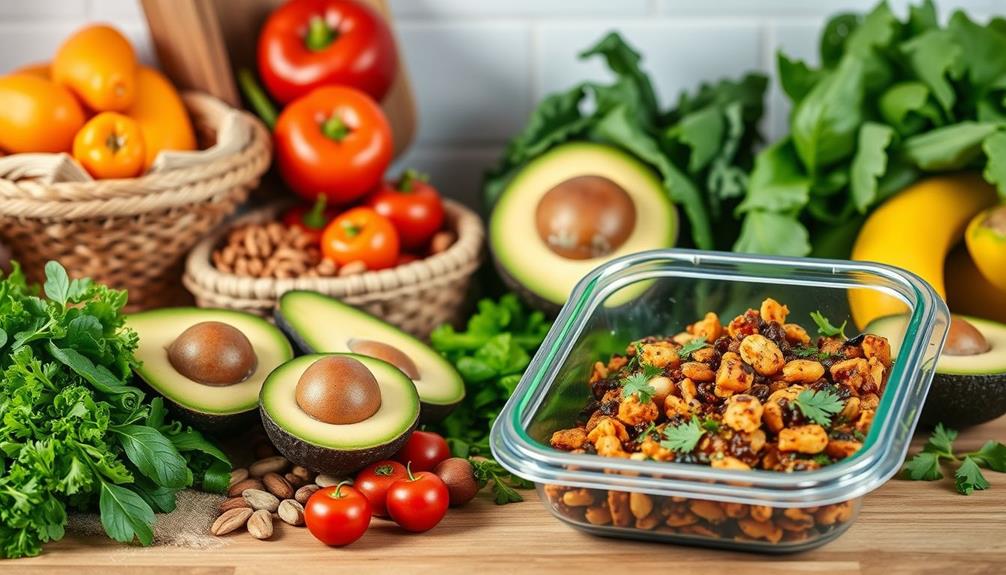
To achieve sustainable success on your keto journey, focus on practical strategies that make the diet easier to follow. Start by meal prepping a week's worth of keto-friendly meals, emphasizing high-fat foods and low-carb vegetables to reduce the temptation of non-compliant snacks.
Gradually decrease your carbohydrate intake over several days to ease into ketosis and minimize potential symptoms of the "keto flu," such as fatigue and digestive discomfort.
Educate yourself on reading nutrition labels to effectively track your daily carbohydrate intake, aiming for a limit of 20-50 grams of net carbs per day to maintain ketosis. Staying consistent with hydration is vital since low-carb diets can lead to increased water loss. Aim for at least 6-8 glasses of water daily and incorporate electrolyte-rich foods like avocados and leafy greens.
Lastly, connect with online keto communities or local support groups for motivation and recipe sharing. Engaging with others can enhance your adherence to the diet and provide valuable tips for overcoming challenges you might face along the way.
With these strategies, you'll set yourself up for long-term success on your ketogenic journey.
Frequently Asked Questions
How Do I Start My Keto Diet for the First Time?
To start your keto diet, calculate your macronutrient ratios, focus on high-fat, low-carb foods, and gradually reduce carbs. Meal prep, stay hydrated, and consider electrolytes to ease the shift and maintain energy. Starting a keto diet can be a big adjustment for your body, so be patient with yourself as you adapt to the changes. It’s also helpful to seek out support from others who are also starting a keto diet or have experience with it. And remember, it’s important to listen to your body and make any necessary adjustments to your meal plan as you go along. Starting a keto diet can be a challenging but rewarding experience, so stay committed and stay focused on your health goals.
How Do Beginners Get Into Ketosis?
Think of your body as a car running low on fuel. To enter ketosis, you'll minimize carbs, boost healthy fats, and stay active. Monitor your ketone levels and hydrate well to keep everything running smoothly.
What Are the Basic Rules for Keto?
To follow the basic rules for keto, you'll limit carbs to 20-50 grams daily, consume high fats like avocados and nuts, and monitor protein intake. Stay hydrated and balance electrolytes to ease your change.
What Foods to Eat to Start Ketosis?
Wondering what foods kickstart ketosis? Focus on high-fat options like avocados and fatty fish, mix in low-carb veggies, and choose moderate protein sources. Avoid sugars and starchy foods to stay under 20-50 grams of carbs daily.
Conclusion
Starting on a keto diet is like setting sail on a new adventure. You've charted your course with essential foods and a solid plan. As you navigate the waters of macronutrients and hydration, keep an eye on your progress, adjusting your sails when needed. Remember, the journey isn't just about reaching the destination; it's about enjoying the ride and finding sustainable habits along the way. So, grab your compass, and let the keto voyage begin!
